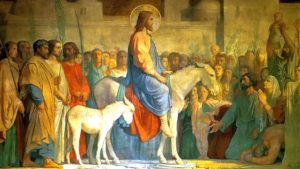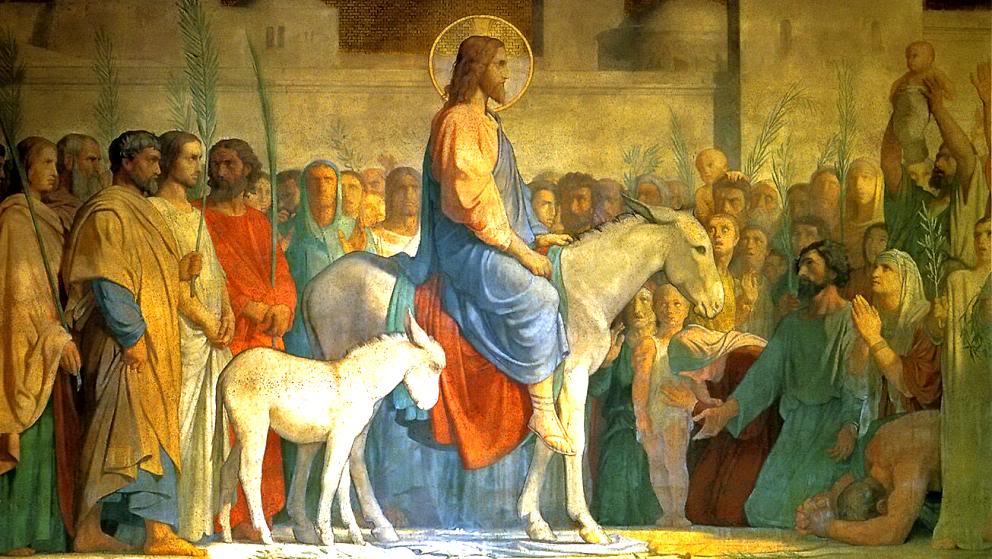
Due to the unique length of today’s readings, this outline will be limited to a few points about the meaning of the texts and will not include the Lectionary text.
To view the Lectionary 35 readings, click here.
At The Procession With Palms — Gospel Mt 21:1-11
- As CCC 559 observes:
- Christ chooses the time and details of his messianic entry into Jerusalem, the city of “his father David.”
- The people acclaim Jesus the Savior: “Hosanna means ‘Save!’ or ‘Give salvation!’”
- Jesus conquers Jerusalem “by the humility that bears witness to the truth.”
- “[T]he subjects of his kingdom on that day are children and God’s poor.”
At The Mass — Reading 1 Is 50:4-7
- As the prophet foresaw, Jesus the Messiah suffered a violent death willingly and in accord with God’s plan, and yet those who caused the suffering were responsible for their actions (CCC 599).
- To all who are “weary,” that is, to those who have been in need for a long time, Christ’s passion can give solace.
- He suffered and we suffer, so our suffering can be a basis for our friendship. We can suffer together.
- We, too, can offer our own sufferings in union with Christ, so we can be collaborators in suffering. We can be co-redeemers.
- We can accept what we cannot change, and so, not rebel, so we can endure the difficulty as long as it is necessary, just as Christ did.
Responsorial Psalm Ps 22:8-9, 17-18, 19-20, 23-24
- The prophet foresaw what furious, violent men would do to the innocent, good man in their power.
- God is completely opposed to evil. God does no evil. Yet he respects the freedom of one person to do evil to another person. This is why it can seem like God abandons his beloved, but he does not.
Reading 2 Phil 2:6-11
- Jesus was “in the form of God” because he is the Second Person of the Blessed Trinity, sharing the same divine nature as the Father. Yet Christ did not meet us as God. Rather, he humbled himself in the Incarnation, meeting us as a human being. Then he further humbled himself by dying for us. He was obedient even to the point of death on the cross. So God the Father exalted him as our universal Lord.
- We are “in the form of God,” too. This is not because we are one of the persons of the Trinity. It is because we are made in the image of God.
- Yet we rebel and try to grasp “equality with God” by not accepting the moral law.
- In this way, we repeat the sin of Adam and Eve.
- We want to decide what is good and evil. We say the evil we do is good. We say the person who does actual good is wrong.
- Or, we can embrace our creaturehood. We can say, “You are God and I am not, so I will be the kind of creature you want me to be, if you will help me.”
- Yet we rebel and try to grasp “equality with God” by not accepting the moral law.
Gospel Mt 26:14—27:66
- “The apostolic faith” means what the apostles believed. What the apostles believed is essential because they were the first followers of Christ, chosen specifically by Christ, and entrusted by Christ with teaching the Gospel.
- According to the Catechism, “St. Peter [formulates] the apostolic faith in the divine plan of salvation in this way:”
- “You were ransomed from the futile ways inherited from your fathers . . . with the precious blood of Christ, like that of a lamb without blemish or spot. He was destined before the foundation of the world but was made manifest at the end of the times for your sake.” (CCC 602)
- The Catechism continues:
- “Man’s sins, following on original sin, are punishable by death. By sending his own Son in the form of a slave, in the form of a fallen humanity, on account of sin, God ‘made him to be sin who knew no sin, so that in him we might become the righteousness of God.’” (CCC 602)
- Christ went about doing good (Acts 10:38) and continued to be innocent goodness, despite what men did to him.
- Christ took the suffering, which his enemies sinfully inflicted upon him, and made it the means by which they can be forgiven and healed.
- The people rightly acclaimed that Jesus was “the one who brings salvation (Hosanna means ‘Save!’ or ‘Give salvation!’”). He did not bring salvation in the way they expected but in the way the Scriptures had announced.
The Homiletic Directory recommends the following Catechism points and themes for Palm Sunday of the Lord’s Passion:
- CCC 557-560: Christ’s entry into Jerusalem
- CCC 602-618: the Passion of Christ
- CCC 2816: Christ’s kingship gained through his death and Resurrection
- CCC 654, 1067-1068, 1085, 1362: the Paschal Mystery and the liturgy

Leave a Reply